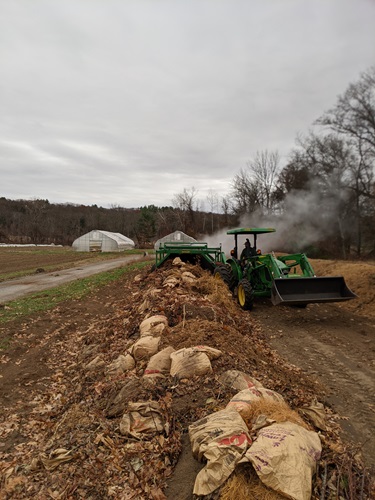The City of Cambridge and its yard waste collection contractor, Save That Stuff, have partnered with The Food Project to pilot an innovative new way to convert Cambridge’s yard waste into rich soil to grow food. The pilot project is a significant step forward in creating a more circular economy while supporting the nonprofit's mission: to build a more sustainable food system and feed those in need.
Each year, The Food Project partners with youth from diverse backgrounds to grow food, grow leaders, and grow change in Greater Boston. Of the 200,000 pounds (100 tons) of food they harvest yearly, they distribute more than 50 percent to families experiencing food insecurity.
The pilot project began in November 2020 when The Food Project was in need of leaves to make a rich soil for growing food. Leaves are a necessary ingredient to create the ideal fertile soil. Typically, Save That Stuff hauls the city’s yard waste to either Brockton or Woburn, MA. Learning of the need for leaves, the city and Save That Stuff worked together to find a way to support The Food Project’s mission.
Save That Stuff hauled approximately 70 tons of leaves from Cambridge to The Food Project’s farm in Lincoln, MA . After curing it for 10 months, The Food Project spread the finished compost onto their farmland in October 2021. Furthermore, Save That Stuff donated an additional 40 tons of finished compost from the facility where they process the remainder of Cambridge’s yard waste.
Collecting yard waste also has tremendous positive impacts on our environment downstream. When residents remove yard waste from lawns, sidewalks, and curbs they keep them from being carried into storm drains. When leaves and twigs get into storm drains, phosphorus is released into the Charles River and Alewife Brook. In water, phosphorus acts as a pollutant, causing toxic algae blooms which are harmful to fish, humans, and pets.
“When we all pitch in to collect leaves and yard waste from our neighborhoods, we can protect our rivers and streams, preserve micronutrients, reduce our impact on climate change, and support a circular economy,” said Michael Orr, City of Cambridge Recycling Director.
Photo: A tractor at the Food Project farm in Lincoln is shown turning the yard waste, a critical step in allowing microbes to convert leaves to finished compost. Photo by Alex Pogany.



